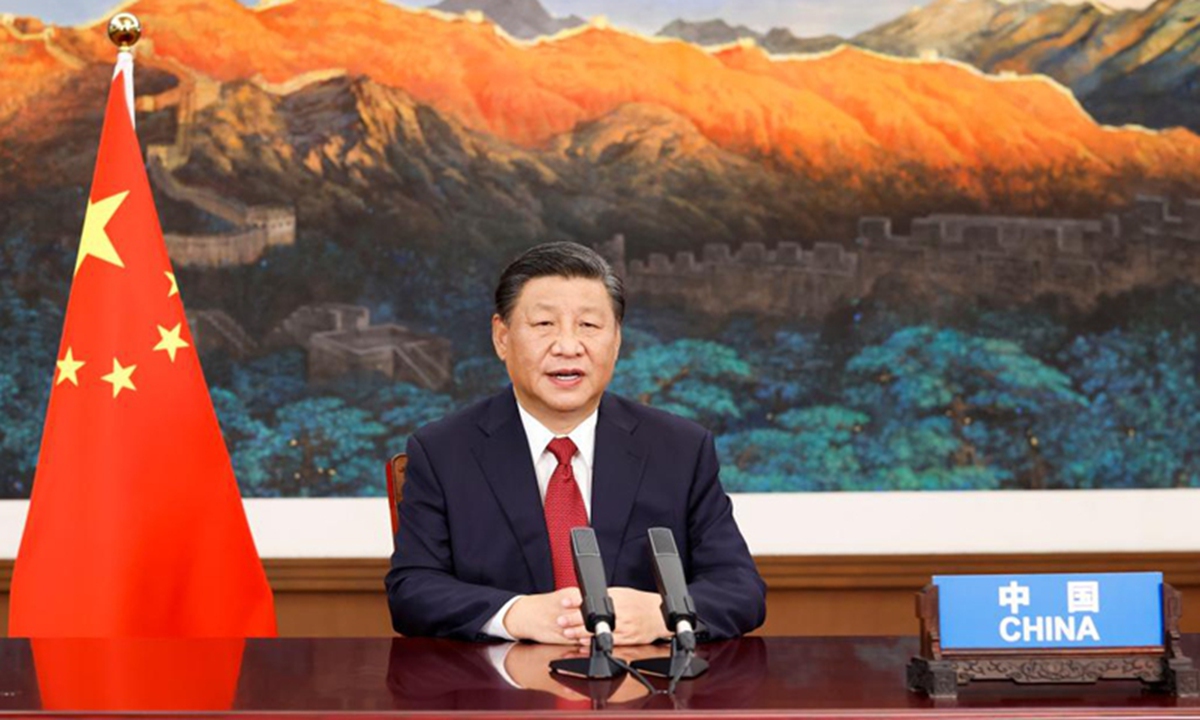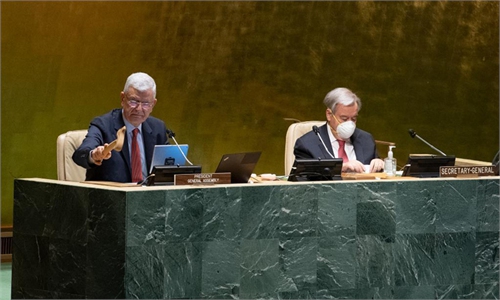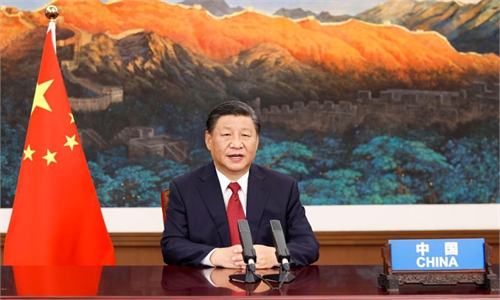Speeches of Xi, Biden show different patterns of China, US: Global Times editorial

Chinese President Xi Jinping addresses the general debate of the 76th session of the United Nations General Assembly via video, in Beijing on Tuesday. Photo: Xinhua
Chinese President Xi Jinping delivered a vital address by video on Tuesday at the general debate of the 76th session of the United Nations General Assembly (UNGA). As US President Joe Biden had made a speech to the UNGA just hours earlier, in comparison, Xi's speech reflects the broad-mindedness of the Chinese top leader, and his fairness and reason when he discussed issues and challenges. The two speeches demonstrated the different political thinking and working logic between China and the US, as well as the different values of the two countries' foreign policies.
Xi's speech was based on the idea of a community with a shared future for mankind. From its theme to the specific initiatives, it focused on the common interests of mankind and the world. The Global Development Initiative, which Xi proposed, is for all countries. To promote the initiative, Xi called for staying committed to development as a priority, a people-centered approach, benefits for all, and result-oriented actions. Xi also highlighted the importance of innovation-driven development and the harmony between humanity and nature. They are universal and do not contain any political exclusion. They are a true practice of strengthening international solidarity and meeting challenges together.
Biden also mentioned the phrase "all people" a lot in his speech. But this was more like the sentimental "rhetoric" part of the whole speech. The actual subject of Biden's speech is the US, together with its allies and partners. From making rules to seeking benefits, it all revolves around this chain of subjects. Other countries are either foils or the challengers of the US that Biden did not name.
President Xi stressed in his speech that the world should embrace civilizations of various forms, and must accommodate diverse paths to modernization. He then emphasized that democracy is not a special right reserved to an individual country, but a right for the people of all countries to enjoy. And military intervention from the outside and the so-called democratic transformation will entail nothing but harm. In the speech, Xi promotes the common values of humanity and rejects the practice of forming small circles and zero-sum games. Such claims either vividly reflect various practices of countries or summarize some important lessons from today's world. For instance, while defending the withdrawal of US troops from Afghanistan, the Biden administration has admitted that it is impossible to remake other countries through large-scale military operations.
Biden's speech not only distinguished its allies and partners from other countries. Disregarding the fact that the US just encountered the fiasco of democratic reconstruction in Afghanistan, Biden continued to blaze the dichotomy which divides the world into "democracy" and "authoritarianism." He gave some of the worst turmoil and wars a fancy label of "democratic vitality." Joint development is the main thread for China to drive global change, while that of the US is to engage in a "democracy movement." China advocates construction, but the US incites contradiction and destruction. The victims of destruction are the vast majority of the developing countries, while the US and the Western world have benefited from it.
Xi's speech is backed and followed up by China's solid actions. For example, China is responding to the UN climate action. It is accelerating the transition to a green and low-carbon economy, and all Chinese people can feel this change. In his remarks, Xi also promised that China would not build new coal-fired power projects abroad. This is widely seen as the latest major commitment China has made.
The incumbent US government is keen on "leading" the global climate action. It has announced its "grand" targets of emissions for 2030 and 2050, and used them to force other countries to take actions. But it's highly uncertain whether the US will accomplish its own goals. The previous Trump administration even pulled the US out of the Paris Agreement. If the next US administration is again a Republican one, the promises Biden made will be very likely rescinded. Even if another Democratic administration is elected, what kind of confidence and resources will it have and use to honor its emissions reduction commitments?
China's deeds match its words, while the US says one thing but does another. A promise made by China is worth a thousand ounces of gold, but the succeeding US government often doesn't admit what its predecessor said and it dares to say anything in order to win an election. This has become an increasingly stereotyped and prominent distinction between China's international images and those of the US.
Neither the Chinese leader nor the US leader named the other's country and capital in their speeches at UNGA. But Biden mentioned "Xinjiang," an autonomous region in Northwest China. By comparison, the contents of both addresses can be widely interpreted as "targeting China" in the speech of the US was greater than"targeting the US" in the speech of China. Biden said the US isn't "seeking a new Cold War," but it's obvious that Washington is on the offensive that launches an all-round crackdown on China. The US has kept advocating suppressing China. Although the latest remarks by Biden have shown some restraint, the content still conveyed the often-seen US aggressiveness.
Justice naturally inhabits man's mind. The heads of state of China and the US both addressed the UN at this special occasion. It's believed the world has the ability to judge who the true defender and promoter of peace and development is, and who the instigator and initiator of division and confrontation is.



